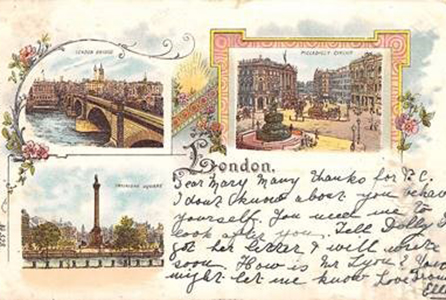Celebrating 150 years of the postcard
Many believe print to be a dying medium amidst an era of digital growth, however hundreds of print users took to Twitter yesterday (October 1st) to celebrate the 150th anniversary of the postcard, showing the global impact this print medium has had over the years.

The postcard sees its 150th birthday
It is believed that the picture postcard dates back to the 17th and 18th centuries, with the popularisation of printing presses and the start of visiting cards, bill heads and writing paper being decorated with illustrations.
The first official postcard was conceived when Viennese Professor of Economics, Dr Emanuel Herrman, raised concerns over the time and effort involved in writing short letters and suggested a more practical alternative for briefer communications was needed.
The Austrian Post put this to practice on October 1st, 1869 in the form of the Correspondenz-Karte – a light brown, 8.5cm x 12cm rectangle with space for an address on the front and a short message on the back.
Happy birthday to 150 years old #postcard from the Finnish Postal Museum. @postcrossing presenting #150yearsofpostcards https://t.co/FA9pwjUzb6 pic.twitter.com/Ay2AddYG1G
— Postimuseo (@Postimuseo) October 1, 2019
Ten years later and Germany began to take over the chromolithography industry and began printing a large number of postcards with illustrated images on the front. It was when Kodak launched the No. 3A folding pocket camera, capable of printing negatives the size of a postcard, that photographs began to be incorporated into their designs.
In 2005, Portuguese software engineer, Paulo Magalhães, created a website platform called Postcrossing where strangers could send and receive postcards across the world. According to 150 Years of the Postcard, over 52 million postcards have been exchanged through this platform since it was launched.
Although imageless postcards were available before this date, Royal Mail gave publishers permission to sell picture postcards in the UK in 1894.
Mark Street, head of campaigns at Royal Mail, describes the print medium as being “a tradition as British as fish and chips” ever since Royal Mail gave them their seal of approval.

One of the earliest examples of a picture postcard, provided by Royal Mail
Reflecting on the impact postcards have had over the years, Street says: “Despite millions being sent on a yearly basis, our research sees the postcard voted the most likely item or pastime to see a revival in popularity in years to come, alongside the likes of fountain pens, calligraphy and love letters.
“Six in ten people would like to see more postcards being sent and received, and seven in ten Brits would prefer to receive a postcard from a holidaying friend or family member over a social media message. When asked why this is the case, respondents overwhelmingly said that it makes them feel special and cited their sentimental appeal.”
Neil Lovell, chief executive of The Printing Charity, reflects on how the personal nature of the postcard means it still has a place in print in a digital world. He says: “If ever there was an example of the printing industry’s ability to adapt to changing technology, it is the postcard. Originally a plain card with a printed stamp produced by the Post Office, it evolved into the picture postcard we know today.

A postcard might seem outdated in today’s always-on digital culture, but who doesn’t love to receive a printed message sent from the heart?”
“A postcard might seem outdated in today’s always-on digital culture, but who doesn’t love to receive a printed message sent from the heart? A postcard is tangible and shows the sender is thinking about you. It is a lasting memento that someone has taken the time to choose [a postcard], write a message, buy a stamp, and post.”
Lovell praises technologies which allow us to personalise postcards for keeping the medium alive and adds: “The TouchNote app lets you choose and personalise your own postcard that is printed and posted for you anywhere in the world.
“So, whether it is a traditional picture postcard sent from a post office of created by an app, the postcard still has a place because it is more personal than a text or email. After all, who is going to save a text saying, ‘wish you were here’?”
If you have any news, please email carys@linkpublishing.co.uk or join in with the conversation on Twitter and LinkedIn.
